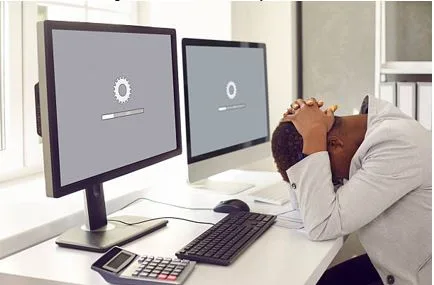Is Your PC Running Slow? 5 Reasons Why and What to Do About It
Introduction
We’ve all experienced it. You click on a program, and you wait. You open a file, and you wait. You’re just trying to get something done, but your PC seems to be moving through molasses. A slow computer is more than just a minor annoyance; it can seriously hurt your productivity and leave you feeling completely frustrated. The good news is that most slow-downs have a clear cause, and many can be fixed without a professional technician.
Here at scomputing.ca, we’ve seen countless computers suffering from this exact issue. We know how frustrating it is when your tech lets you down, so we’ve put together this guide to help you figure out what’s slowing your PC down and what you can do about it.
5 Common Culprits of a Slow PC
So, why is your computer moving at a snail’s pace? It’s usually one of a few common problems.
- Too Many Programs Starting at Once: Every time you install a new app, it often sets itself to launch automatically when you turn your PC on. Over time, all these programs starting up at the same time can bring your computer to a crawl before you even get a chance to use it.
- Your Hard Drive is Full: Think of your hard drive as a closet. When it gets too full, it’s hard to find anything, and things just start to get cluttered and inefficient. Your computer needs a bit of free space to perform tasks and run properly, so a packed hard drive can seriously impact performance.
- A Malware or Virus Infection: Malicious software can run secretly in the background, consuming your PC’s resources and bandwidth. Viruses and malware are often the silent culprits behind unexplained slow-downs.
- Outdated Software and Drivers: Just like your phone, your PC’s operating system, software, and hardware drivers need to be updated. These updates often contain critical bug fixes and performance improvements that can help your computer run more efficiently.
- Aging Hardware: Sometimes, the problem isn’t software at all. If your computer is several years old, its components—like the RAM or hard drive—might simply not be fast enough to keep up with today’s modern software.
What You Can Do About It (Simple Fixes)
Before you bring your PC in for a check-up, try these simple, do-it-yourself steps:
- Clean Up Your Startup Programs: Go into your Task Manager (press Ctrl + Shift + Esc) and click on the “Startup” tab. You’ll see a list of everything that launches when you turn your PC on. Disable any non-essential programs you don’t need right away.
- Free Up Some Disk Space: Go through your files and uninstall programs you no longer use. Delete old downloads, clear your recycle bin, and move large files like videos to an external drive.
- Run a Full Virus Scan: Use your antivirus software to perform a deep scan of your entire computer. If you don’t have one, there are free, reputable options available.
- Check for Updates: Go to your computer’s settings and check for a new version of Windows (or your operating system). Also, visit your PC manufacturer’s website to make sure your drivers are up to date.
When to Call an Expert
If you’ve tried all the simple fixes and your PC is still dragging, the problem might be more serious. A professional can run a deeper diagnostic to find hidden issues, remove complex malware, or install new hardware to give your PC a much-needed boost. We can help with all of that and more.
If you’re ready to get your computer running like new again, you canbook a repair online. For a one-on-one chat, you can find our locations here or visit here.
Conclusion
A slow PC is a frustrating but fixable problem. By understanding the common causes and trying a few simple steps, you can often restore your computer’s performance. If the problem persists, don’t worry—a professional can quickly diagnose and fix the issue, getting you back to a fast, efficient computing experience.
FAQs
Q: Will a full hard drive really slow down my PC that much?
A: Yes, absolutely. Your operating system needs space to create temporary files and run smoothly. When the drive is full, it has to work much harder just to perform basic functions.
Q: Can a slow PC be a sign of a failing hard drive?
A: It can be. A failing hard drive can cause severe slowdowns. If you hear clicking or grinding sounds from your computer, or if it freezes unexpectedly, you should back up your data immediately and have the drive checked by a professional.
Disclaimer
This information is for general educational purposes and is not a substitute for professional technical advice. For complex issues or advanced repairs, please consult with a qualified professional.




